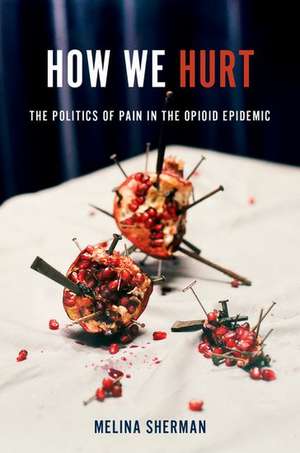How We Hurt: The Politics of Pain in the Opioid Epidemic
Autor Melina Shermanen Limba Engleză Paperback – 7 noi 2023
Preț: 133.15 lei
Preț vechi: 163.19 lei
-18% Nou
Puncte Express: 200
Preț estimativ în valută:
25.48€ • 26.68$ • 21.13£
25.48€ • 26.68$ • 21.13£
Carte disponibilă
Livrare economică 08-14 martie
Livrare express 05-11 martie pentru 51.36 lei
Preluare comenzi: 021 569.72.76
Specificații
ISBN-13: 9780197698235
ISBN-10: 0197698239
Pagini: 200
Ilustrații: 4 b/w figures
Dimensiuni: 157 x 235 x 13 mm
Greutate: 0.3 kg
Editura: Oxford University Press
Colecția OUP USA
Locul publicării:New York, United States
ISBN-10: 0197698239
Pagini: 200
Ilustrații: 4 b/w figures
Dimensiuni: 157 x 235 x 13 mm
Greutate: 0.3 kg
Editura: Oxford University Press
Colecția OUP USA
Locul publicării:New York, United States
Recenzii
Pain is the root of the opioid crisis. In this stunning book, Melina Sherman takes us to the depths of American despair, the heights of pharmaceutical corruption, and the netherworld where narcotic promises dissolve. How We Hurt is an incendiary, infuriating, and utterly necessary book." Eric Klinenberg, author of 2020: A Social Autopsy and Palaces for the People
How We Hurt is the most rigorous analysis to date on the causes and consequences of the opioid epidemic that has killed over one million people and wrecked families and communities around America. Brilliantly written, it will redefine the terms of the public debate. Essential reading for policy makers, students, journalists, and concerned citizens." Manuel Castells, Professor Emeritus of Sociology, University of California, Berkeley
Sherman's book is incredibly timely, important, and absolutely unique. She offers readers an often overlooked history of the opioid crisis, and makes crucial connections between the regulation of pharmaceutical drugs, the moral and social panics around the opioid "epidemic" the branding of painkillers as a "right to be free from pain," and the histories of physicians and medications, giving us in the process a beautifully written and urgent framework for critically analyzing the different dimensions of drug use, and over-use, in US society. Her important critique of the structures of constraint, control and exclusion that characterize what we now call the opioid epidemic is essential reading for not only academics but also the public at large. An absolute must-read!" Sarah Banet-Weiser, Professor, Annenberg School for Communication
How We Hurt presents a well-written analysis of pain from a sociological point of view, from a social constructionist perspective.
How We Hurt is the most rigorous analysis to date on the causes and consequences of the opioid epidemic that has killed over one million people and wrecked families and communities around America. Brilliantly written, it will redefine the terms of the public debate. Essential reading for policy makers, students, journalists, and concerned citizens." Manuel Castells, Professor Emeritus of Sociology, University of California, Berkeley
Sherman's book is incredibly timely, important, and absolutely unique. She offers readers an often overlooked history of the opioid crisis, and makes crucial connections between the regulation of pharmaceutical drugs, the moral and social panics around the opioid "epidemic" the branding of painkillers as a "right to be free from pain," and the histories of physicians and medications, giving us in the process a beautifully written and urgent framework for critically analyzing the different dimensions of drug use, and over-use, in US society. Her important critique of the structures of constraint, control and exclusion that characterize what we now call the opioid epidemic is essential reading for not only academics but also the public at large. An absolute must-read!" Sarah Banet-Weiser, Professor, Annenberg School for Communication
How We Hurt presents a well-written analysis of pain from a sociological point of view, from a social constructionist perspective.
Notă biografică
Melina Sherman is a communication scholar and lead health researcher at Knology in New York City. Her research interests center on the relationship between health, culture, and media. Her work has appeared in a number of communication and social science journals, including Public Culture, Communication, Culture & Critique, and the International Journal of Communication.
